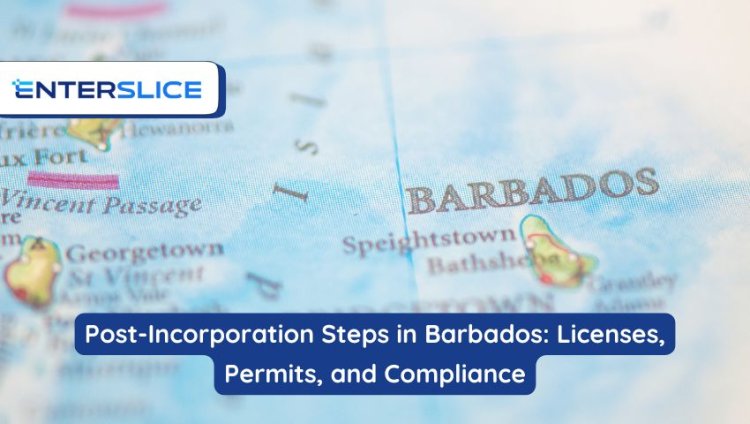Post-Incorporation Steps in Barbados: Licenses, Permits, and Compliance
Completed your company registration in Barbados? Discover the essential post-incorporation steps, including business licenses, permits, and compliance for your Barbados company.
Share this Post to earn Money ( Upto ₹100 per 1000 Views )

Barbados has earned a reputation as one of the most attractive jurisdictions for international business, thanks to its stable economy, favorable tax treaties, and strong legal infrastructure. If you’ve completed your company registration in Barbados, congratulations, you’re now ready to move on to the next critical phase: post-incorporation.
Registering your company is only the beginning. To ensure your business can legally operate and avoid future penalties or disruptions, you must understand the post-incorporation landscape, which includes obtaining the necessary licenses, registering with relevant authorities, and adhering to ongoing compliance obligations.
This guide will walk you through all the post-incorporation steps required after you register a company in Barbados or begin opening a company in Barbados.
Step 1: Obtain a Certificate of Incorporation
Once your incorporation documents are approved by the Corporate Affairs and Intellectual Property Office (CAIPO), you’ll receive your Certificate of Incorporation. This legal document is proof that your company has been officially formed and is ready to begin operations.
Keep this certificate safe—it’s often required when applying for business licenses, opening bank accounts, or registering with government authorities.
Step 2: Apply for a Business Name Registration (if needed)
If your company intends to operate under a trade name (different from the legally registered name), you'll need to register the business name with CAIPO.
Required Information:
-
Proposed trade name
-
Company registration number
-
Principal place of business
-
Nature of business activities
Step 3: Register for a Tax Identification Number (TIN)
All companies in Barbados must register with the Barbados Revenue Authority (BRA) to obtain a Tax Identification Number. This is used for corporate tax, income tax withholding, and VAT (if applicable).
To Register:
-
Submit Certificate of Incorporation
-
Business name (if applicable)
-
Details of shareholders and directors
-
Company bylaws or articles
Step 4: VAT Registration (if applicable)
If your company’s taxable supply of goods and services exceeds BBD 200,000 annually, VAT registration is mandatory. Even if you anticipate lower revenue, voluntary registration is allowed and can be beneficial if you’re reclaiming VAT on business expenses.
Apply for VAT registration at the BRA, and once approved, you’ll receive a VAT Registration Certificate with your VAT number.
Step 5: Apply for Relevant Business Licenses and Permits
Depending on the nature of your business, you may need to apply for specific operational licenses. Barbados requires permits for certain industries to ensure public safety, fair trade, and environmental protection.
Common Business Licenses:
-
Tourism License – Required for hotels, guest houses, or tourism operators.
-
Liquor License – Required for establishments selling alcohol.
-
Import/Export License – If dealing in international trade.
-
Food Handling Certificate – For restaurants, cafes, and food production.
-
Financial Services Licenses – For banks, insurance firms, or investment companies (regulated by the Financial Services Commission or Central Bank).
Check with the Ministry of Industry, Commerce and Business Development or sector-specific regulators for your industry’s licensing requirements.
Also Read: Procedure for Business Setup in Hungary
Step 6: Open a Corporate Bank Account
Opening a bank account in Barbados can take some time due to due diligence and Know Your Customer (KYC) protocols. Most banks will require:
-
Certificate of Incorporation
-
Company By-Laws or Articles of Association
-
Business Plan or Nature of Business Description
-
Director and Shareholder Identification (passports, proof of address)
-
Tax Identification Number
Some banks may require an in-person visit, though a local service provider may assist with introductions or setup.
Step 7: Register for National Insurance (NIS)
If your company hires employees, registration with the National Insurance Scheme (NIS) is mandatory. This covers benefits such as pensions, maternity leave, and unemployment.
You must:
-
Register as an employer with the NIS
-
Submit employee details
-
Deduct and remit employee and employer contributions monthly
Step 8: Set Up Accounting and Tax Reporting Systems
Maintaining proper financial records is a legal requirement and essential for compliance. Barbados companies are required to:
-
File corporate income tax annually
-
File VAT returns (monthly or quarterly)
-
Submit financial statements annually (audited for larger companies)
-
Maintain books of accounts and issue invoices that comply with local regulations
Hiring a local accountant or using a business process outsourcing (BPO) firm is strongly recommended, especially if you’re not based in Barbados full-time.
Step 9: Comply with AML and Economic Substance Requirements
If your company is engaged in international business or operates as a holding or finance entity, it may be subject to Economic Substance Regulations.
Requirements may include:
-
Demonstrating physical presence or core income-generating activities in Barbados
-
Appointing qualified directors and staff
-
Filing annual economic substance declarations with the Barbados International Business Unit (IBU)
You may also be required to comply with Anti-Money Laundering (AML) obligations, especially if your business handles client funds or financial services.
Also Read: Legal Requirements to Start a Business in Lebanon
Step 10: Maintain Corporate Records and Renewals
Barbados companies must comply with several ongoing obligations:
| Requirement | Frequency |
|---|---|
| Annual Return Filing | Annually with CAIPO |
| Corporate Tax Filing | Annually with BRA |
| VAT Return (if registered) | Monthly or quarterly |
| License Renewals | Annually or as required |
| Economic Substance Filing | Annually (if applicable) |
Failure to meet these obligations can result in fines, loss of good standing, or even company dissolution.
Benefits of Staying Compliant in Barbados
-
Enhanced credibility with banks, clients, and investors
-
Eligibility for tax treaties and international trade benefits
-
Protection from penalties and legal issues
-
Maintaining good standing status with CAIPO and the Revenue Authority
Whether your business operates locally or internationally, compliance is not optional—it's foundational to your long-term success in Barbados.
FAQs
1. Do I need a physical office in Barbados after company registration?
It depends. While it's not mandatory for all business types, companies subject to Economic Substance Requirements must demonstrate local presence. Additionally, most licenses require a registered business address in Barbados.
2. Can I open a company in Barbados as a non-resident?
Yes, non-residents can fully own and register a company in Barbados. However, local representation and compliance with local regulations—including bank and tax filings—are mandatory.
3. What happens if I fail to comply with annual filing requirements?
Non-compliance may lead to penalties, interest charges, or even deregistration by CAIPO. It’s essential to meet all post-incorporation compliance deadlines to maintain your company’s legal standing.
Final Thoughts
Successfully registering a company in Barbados is a major milestone, but the real work begins after incorporation. Securing licenses, meeting tax obligations, and staying compliant with local regulations are critical to ensuring your business operates smoothly and legally.
Barbados remains a robust, business-friendly jurisdiction—but like any country, it requires discipline and local understanding. By completing all post-incorporation steps and consulting with local legal and tax advisors, your business can thrive in this Caribbean hub.
















